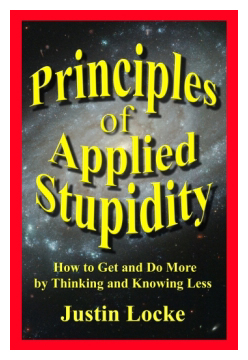Well I must say I was thrilled to death to be mentioned again in Dr. Gene Lindsey’s newsletter today (sorry to not have a link, it’s a private mailing).
For those who are surfing in from there, welcome. With apologies to my regular readers, this post is to elaborate on his topic.
In his newsletter, Gene talked about the issue of medical error becoming the third leading cause of death in the United States, and why so little is being done about it. Gene and I talk a lot about why things don’t change or get better. He brings a medical perspective and I bring a musical one . . . Gene is a voracious reader and one of the things that brought us together to chat was my book, Principles of Applied Stupidity.” (available on kindle)
This is a book about shame, that is, our fear of being seen as vulnerable, needy, and imperfect, how that fear is used to manipulate us. Our fear of being imperfect is a very handy way for marketers and politicians to do an end-run around our common sense. (The book takes a pragmatic tongue-in-cheek approach, to show you how to amorally use this vulnerability to your own advantage.)
We all are imperfect of course, but our society is intolerant of such things, and demands that we conceal it. Doctors are under particular cultural pressure to “be perfect.” But when it comes to medical error, shame energy can actually blind the mind to reality. The ongoing pretense that we “don’t make mistakes” is a leading cause of why the mistakes we make don’t get acknowledged, much less fixed.
Our immersion in what I call “smartism” starts early and is taught systematically. We attach enormous shame (i.e., inner-directed personal loathing of self) to failing tests in school, and enormous pressure to get into Harvard. This is a flawed system. There is no big victory for the “A” students; they start to think that their social acceptance is based solely on superstar performance, and they become fractured spirits, becoming human doings instead of human beings. Instead of a sense of social teamwork, shame energy, i.e., our intolerance of the reality of our imperfections, puts us in an unwinnable bitter battle to always be better than someone else. No matter how well you do in such a battle, you lose, for in the end, you do not have community acceptance, the glorious opposite of the dark energy of shame.
I grew up in major orchestra culture, and shame issues were handled in a much different way. There is no possibility of concealing errors on the stage of Symphony Hall. Pretension was exposed immediately, and derided harshly. To live in that mastery environment, you had to be able to accept your imperfections; before this concert is over, you are going to make a mistake, and everyone is going to hear it. In fact, learning to deal with those internal shame issues was 60% of the job, and was the true dividing line between stars and wannabes. It was not just an individual thing, either; the entire system had procedures in place to keep mistakes to an absolute minimum, knowing they were bound to happen. It was a broad cultural phenomenon, a combination of hard work, careful planning, massive humility, and a 500 year old version of Toyota lean efficiency process.
I really do believe that we have exhausted the systemic/industrial approaches to our problems and it is time to start thinking like artists again in our approach to just about everything.


2 Responses to Shame, Smartism, and Medical Errors